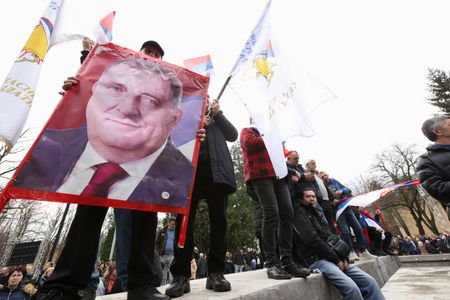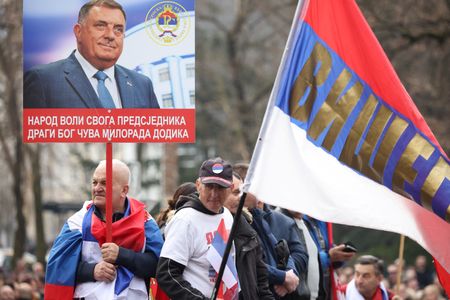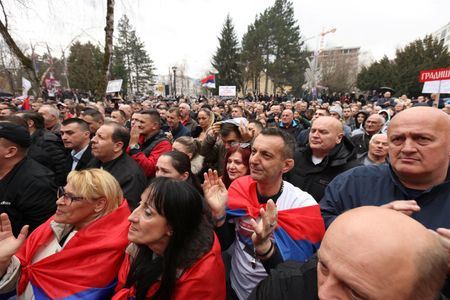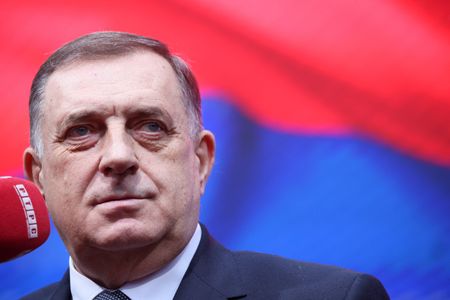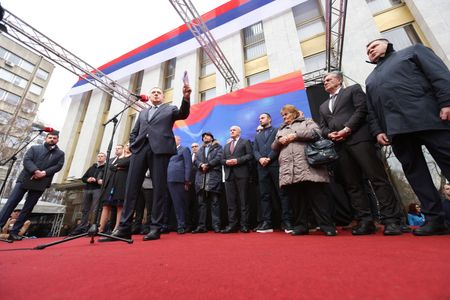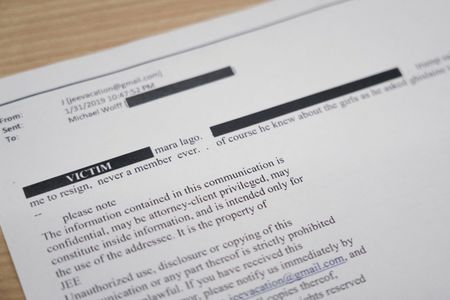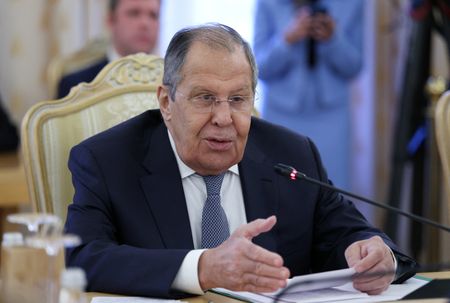By Daria Sito-Sucic
SARAJEVO (Reuters) -A Bosnia court on Wednesday sentenced Bosnian Serb separatist leader Milorad Dodik to one year in jail and ordered him to step down as president of the country’s Serb-dominated region for six years for defying orders of an international peace envoy.
Dodik, head of Bosnia’s autonomous Serb Republic, was indicted in 2023 for signing laws that suspended rulings by the constitutional court and by international peace envoy Christian Schmidt, whose role was created in 1995 to stop the Balkan country slipping back into war.
Dodik, who has close ties with Russia, has rejected the indictment and retaliated with measures to reduce the state’s presence in his Serb-dominated region of Bosnia by banning the state prosecutor, the state court, and the intelligence agency.
He will likely avoid jail time because Bosnians can pay a fine instead of incarceration if the sentence is no more than one year.
He has two weeks to appeal the ruling, which will become official when the appeal process is over. Neither he nor his lawyers were present in court on Wednesday.
“There is no more Bosnia-Herzegovina as of today,” he told a crowd of supporters in Banja Luka. “I need the support of the people and I will go to the end.”
CONFLICT
The verdict marks another low point in Bosnia, which suffered a bloody ethnic conflict the 1990s and has since been split into two autonomous regions: Dodik’s Serb Republic and the Federation shared by Croats and Bosniaks. They are linked via a weak central government that has been unable to bridge lingering divisions.
It also underscores the divide in sympathies in the Balkans between those seeking integration with the West and those sympathetic to Russia.
Critics say Dodik, who has long called for the Serb Republic to break away and form a union with neighbouring Serbia, has been a destabilising force who has fuelled the kind of ethnic and political tensions that tore Yugoslavia apart in the 1990s.
But he has allies in Serbia’s President Aleksandar Vucic and Hungary’s Prime Minister Viktor Orban. Dodik said he had spoken to both leaders by phone on Wednesday.
“We made fun of those in Sarajevo,” Dodik said.
In a post on X, Orban said the verdict was part of a “political witch hunt” and an “example of the weaponisation of the legal system aimed at a democratically elected leader”.
Another Dodik ally, Russia, called the court’s ruling “a strike on stability in the Balkan region”.
Bosnia’s 1992-95 war – part of a wider set of conflicts that followed the breakup of Yugoslavia – killed about 100,000 people. Under a U.S-backed deal in 1995, known as the Dayton Peace Agreement, power was given to the two autonomous regions.
Under the agreement, peace envoy and German ex-government minister Schmidt has the power to interpret the peace deal. But Dodik has been under U.S. and UK sanctions for obstructing it.
He, like many Serbs, says Schmidt has no legal authority because his appointment was not endorsed by the United Nations Security Council.
The original indictment came after Dodik signed two laws that Schmidt had revoked saying they defied Bosnia’s constitution and the terms of the peace deal.
One law suspended rulings by Bosnia’s constitutional court and the second ended publication of the peace envoy’s decrees and laws in the Serb Republic’s official gazette.
(Writing by Edward McAllister; Editing by Christina Fincher, Andrew Heavens and Gareth Jones)

